1829 Tundra Wizard’s personal stories
KWANDUR
by Cole Pauls
Wolfville, NS: Conundrum Press, 2022
$25.00 / 9781772620771
Reviewed by Jeff Stychin
*
 KWANDUR is one of the truest forms of expression and stylistic artwork portrayal that I’ve come across since reading his comic Pizza Punks, which is also a must-read.
KWANDUR is one of the truest forms of expression and stylistic artwork portrayal that I’ve come across since reading his comic Pizza Punks, which is also a must-read.
Cole Pauls is a Champagne and Aishihik citizen and Tahltan comic artist, illustrator and printmaker. He has a BFA in illustration from Emily Carr University. Originally from Haines Junction, he now lives in Vancouver.
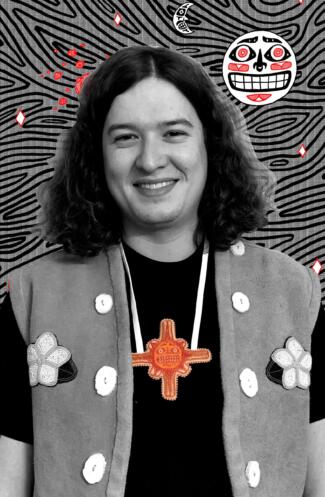
This book is filled with personal stories from Pauls’ life, along with a carried narrative of personal struggle, ceremony and tradition. I doubt I would be able to properly describe how meaningful and important this book is. The revealing honesty and sincere nature of Pauls’ upbringing is so meaningful and it comes across in its purest form as he tells his childhood stories of Indigenous home cooked meals, homelands burned and repaired, children’s games and stories, class struggles at Emily Carr and his journey towards finding his people, those he connects with, who understand him and share in his values, trust and loyalties. There is so much here in these pages it will leave you stunned, uplifted and more honest and possibly in tears. In the notes section at the end of this book you learn how each comic is jointed together from Pauls’ time in school throughout his adolescence as well as his work into adulthood that carefully crafted this collection in a heartfelt way.
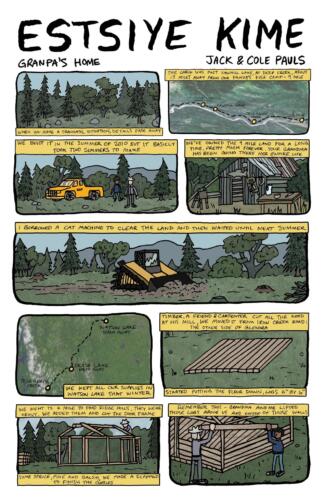
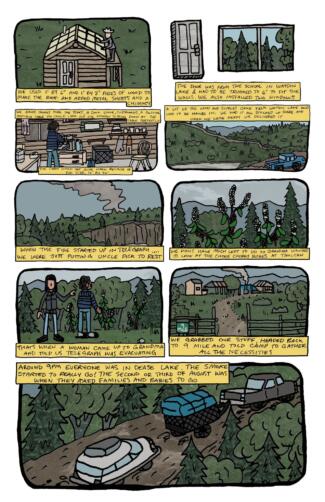
The comic collection does a number of things very well including teaching you about the struggle and history of Pauls’ Indigenous people, showing you the struggle and journey of an artist, and teaching you to become an Indigenous ally. It also includes how to respect one another and including those you might judge first.

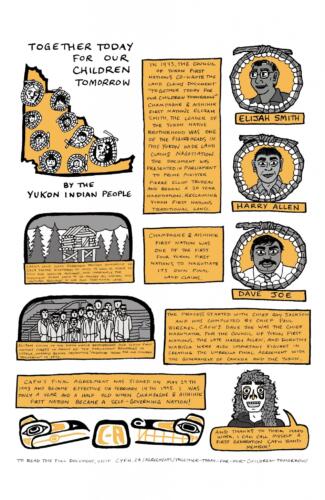
There are a good number of colours used and some really cool drawings and artwork that I highly dig. From the vibrant “My first crit at Emily Carr” that takes up two pages in depth and for good reason, all the way back to the “YÁT’AY” (Space) with a darkened brown, beige and black, the bats and owls in “Full Moon Last Night” are awesome! Rich with detail and I’m such a sucker for the Halloween season, as this comic brings me there instantly with all the good spooky vibes that anyone can relate to.
I feel there is not only a playful nature in this collection filled with light-heartedness, but the comics for me reflect a lot of the emotions that Pauls has gone through during his years at school and growing up in the Yukon at Haines Junction. I think having nature be so personal to him and his family that really shines through in these illustrations and stories.
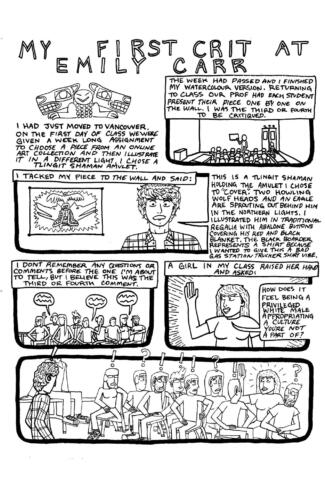
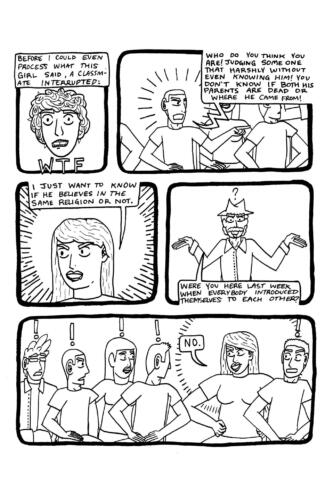
One of my favourite panels is NÀDÄY GÄN (Dry Lynx Mountain). There is simple dialogue as you watch someone enjoy the snow outside, sledding downhill and exclaiming their experience of joy written in both English as well as the Indigenous language, Southern Tutchone. I love how this singular comic is done in a calming blue palette. It just flows with serenity while teaching you words you most likely haven’t heard before, all the while highlighting a pastime that is cherished.
In the panel “Permanent Regalia,” Pauls illustrates the importance of not getting tattoos without approval of the artist’s work beforehand, and to know the difference between celebrated tattoo art with purpose, as opposed to Indigenous appropriation. “The skull & headdress is a symbol of genocide, we are still here! How does a tattoo that glorifies assimilation, colonialization and mass murder honour me and my people?” (p. 54). There are a lot of stereotypes in traditional tattoo art styles and I argue along with Pauls that many should be retired. “Just remember each artwork comes with its own history and meaning to indigenous culture and a design could be attached to a single community. Each tattooer has their own rules and boundaries to get tattooed by them, they decide what’s for non-indigenous people and what’s only for indigenous people. And tip them accordingly!” (p. 55).
There is no end in sight with what you can see in this comic collection, from school games to road trips, to camping and building shelter, hunting and camping ghost stories and arctic sledding, stinky dogs and outer space travel, video game history and nagging outdoor insects. Pauls somehow manages to capture all of these experiences and bring them into a cohesive vision of Indigenous celebration, to a platform that’s accessible to everyone and shows you how important your culture, history and traditions are. Pauls has put together an anthology which is truly a celebration of his family and their bonded traditions and shared stories. There are no words to describe or do justice to explain the significance and the emotional quality this book has. It is stunning. If you haven’t read his work, then you’d better put KWANDUR at the top of your reading list. This collection will leave you with new internalized ideas, love and respect for others’ differences, and a questioning of just how much you feel connected to where you come from.
*
 Jeffrey Stychin has felt like a man out of time and in the wrong place ever since he noticed the town he grew up in, in the BC interior. He studied verse and poetry through music and art. He began writing as a means of catharsis and as a way to communicate with himself and others. A Vancouver barber by day, a poet by night, he currently resides with his thoughts and dreams in a quiet place full of trees. Editor’s note: Jeffrey Stychin has also reviewed books by Earle Peach, Sonja Ahlers, Cole Pauls, Jeremy Stewart, and Brodie Ramin for The British Columbia Review.
Jeffrey Stychin has felt like a man out of time and in the wrong place ever since he noticed the town he grew up in, in the BC interior. He studied verse and poetry through music and art. He began writing as a means of catharsis and as a way to communicate with himself and others. A Vancouver barber by day, a poet by night, he currently resides with his thoughts and dreams in a quiet place full of trees. Editor’s note: Jeffrey Stychin has also reviewed books by Earle Peach, Sonja Ahlers, Cole Pauls, Jeremy Stewart, and Brodie Ramin for The British Columbia Review.
*
The British Columbia Review
Interim Editors, 2023-24: Trevor Marc Hughes (non-fiction), Brett Josef Grubisic (fiction)
Publisher: Richard Mackie
Formerly The Ormsby Review, The British Columbia Review is an on-line book review and journal service for BC writers and readers. The Advisory Board now consists of Jean Barman, Wade Davis, Robin Fisher, Barry Gough, Hugh Johnston, Kathy Mezei, Patricia Roy, Maria Tippett, and Graeme Wynn. Provincial Government Patron (since September 2018): Creative BC. Honorary Patron: Yosef Wosk. Scholarly Patron: SFU Graduate Liberal Studies. The British Columbia Review was founded in 2016 by Richard Mackie and Alan Twigg.
“Only connect.” – E.M. Forster